Why is my flight delayed in foggy weather?
Why is my flight delayed in foggy weather? It sometimes surprises visitors to an airport tower just how visual the job is. Controllers in the Visual Control Room are physically looking at the aircraft they’re guiding, with minimal use of radar. The clue is in the name, I suppose!
But during periods of bad weather such as fog, like parts of the UK are experiencing today, the rest of the airport can become completely invisible from the tower.
In these circumstances control has to switch to radar and ‘low visibility procedures’ to ensure airport operations can continue safely. These special procedures cover aircraft on approach and departure, as well as movements on the ground.
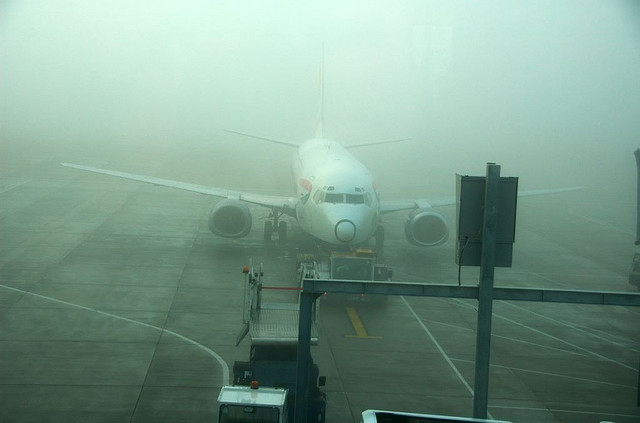
A foggy Gatwick Airport by zzathras777 via Flickr
In foggy conditions, aircraft use the Instrument Landing System (ILS) at the airport to be automatically guided to the runway – they are effectively following the ILS beam all the way to touch-down. It is therefore important that we protect the beam from any interference, such as from other aircraft on the runway.
This means spacing between aircraft has to be increased, with an aircraft having to touch-down and taxi far enough away from the runway such that it no longer interferes with the ILS beam before the next one can be given landing clearance. Typically this means the spacing between aircraft has to increase by up to 50%.
Aircraft are also more widely spaced when manoeuvring or taxiing, whether they’re arriving or departing.
All this takes extra time, effectively taking capacity out of the airport with the end result often being delays to passengers sitting in the terminals.
Whenever there’s bad weather we work very closely with airlines and airport operators to handle safely as many flights as possible and minimise the disruption.
As ever, if you’re concerned about the effect bad weather might have on your flight, you should contact your airline which will be able to provide you with the latest information.
Airside Elliot: My Aviation Story So far
Airside Elliot: My Aviation Story So far: I had always wanted to work in aviation from a very young age, I loved watching Airport and Airline as a child, I found the program so intriguing, I am convinced the shows planted the seed in my brain that I wanted to work in aviation and be part of such an amazing industry, I always remember how I felt as a young child when at the airport, there was just something about the hustle and bustle of the airport that I loved, the excitement of flying, the smell of kerosene, the different types of aircraft and the sounds of the planes landing and taking off, There is a buzz in the air, I still find the airport just as exciting now as I did when I was a child, I could spend all day watching the aircraft taking off and landing, its something I see day in day out at Gatwick but even after 6 years in the airport I love it.
I was determined that I would work in aviation. I would not give up on my dream, I always wanted to cabin crew, The job always fascinated me, I remember watching the crew when I was a passenger and dreaming that one day that it would be me wearing that uniform. I had to keep dreaming until I was old enough.
Fast forward to November 2011, My local airport which had always been quiet, got the approval for a runway extension, this was amazing news for me, I had dreamed at working at an airport and now my local airport was expanding. Even better news, later on that year easyjet announced that they would open up a base at the airport.
Whilst I had always wanted to be crew, I just didn’t have the confidence in myself to actually go for an assessment day as I felt I would fail and not make it, although I applied to work for easyjet and did get an interview I never actually booked an interview. So I was checking the airports website daily for jobs to come up. Then the day finally came, “seasonal passenger services and security agent” I had to apply for this job, It meant the world to me. It was my foot in the door into a growing airport and into aviation.
After submitting my application I had a nail biting few weeks while I waited to hear back from the airport, I finally got the call that They wanted to invite me for an interview. The date was set, I spent weeks and weeks researching London Southend and the growth plans, I knew everything about the airport. The day of the interview came and I found out 2 days later that I had been successful. I was elated with myself, I felt on top of the world, I had finally made it!
March 2012, My start date had finally came, It was my first day, I felt so proud, I walked into the terminal with my head held high, I had made it. I was finally part of the London southend airport story. Because the airport was so small, every staff member at the time did passenger services and security, The 3 week training course begun, oh my god what have I got myself into, I doubted myself that I was going to be able to pass this training. There was so much to learn in a short period of time. I was even more sacred about scanning bags on the Xray, the security of passengers and safety of aircrafts was in my hands, I had such a big responsibility, being only 18 I was extremely nervous about this. However everyone on my course passed the training.
There was so much to Learn. I was finally someone when I got my first airside pass, I wore this proudly, I had made it. One manager said to me and it has always stuck with me because its true – “if you last the first year in aviation, you will be in it for life” It is so true and I will explain later on. I was absolutely loving my work, I loved carrying out security patrols around the airport because I was able to spot planes outside, it was a whole new world. After a few months of just doing security the time had come for me to ask to go onto check in, to me security whilst a major part of aviation, it wasn’t me, I dreamed of working on check in and working with the passengers.
I remember the day I check in my first passenger flying to Malaga. Being the face of easyjet or Aer lingus was more like what I had wanted to do all my life, I loved checking in flights especially the Thomson flight to Palma on a Saturday because it was different and there always seamed to be problems which I liked because it gave me experience in problem solving. Check in and boarding was defiantly my favourite job at London Southend, I love how the check in area looked, I would always swap with people if I knew I was going to be in security.
Whilst working at London Southend I was also featured on the TV problem – Stobart: trucks trains and planes, I was amazed that the tv crew actually wanted to follow me around for the day, they found it fascinating that I was into plane spotting and that I flew to Oslo to try out the Norwegian B787. After a day of filming, I was on TV a few months later, I could not believe it !!
Towards the end on 2014 things started to decline, I wanted to progress into a dispatch role, However the positions just never came up or when they did they company would offer them to people with experience. I went for a team leader jobs but again it was a no, I started to become disillusioned I was bored, angry as I felt the company was holding me back I was stuck in a rut, a job and airport I once loved, I started to resent and hate, I became a very negative person towards the company, whatever I tried to do I just couldn’t shake the hate and negativity I had a very supportive supervisor who tried to get me to snap out of it, she was problem one of the only people that tried to help me.
2015 was a very hard year for me, feeling at an all-time low, at the airport, things started to happen, I had strained relations with managers and HR (I won’t go into details) It lead to handing in my notice and leaving, It was a very sad day for me, however I had to leave the airport, I left on bad terms. its only in the last year that I have come to terms with events and let go and moved on.
My last shift at the airport was very emotional, 3 years of working with such a great team had come to an end. A few days after leaving London Southend airport I took a job at London city Airport, as a passenger service agent, i thought it was a step up from London Southend, However after just 1 month I wasn’t enjoying my time at the airport, the airport was great, lots going on and lots of new things to learn, I however missed London Southend and I couldn’t see a future at London city. So I left, I have no regrets about leaving London City, the time was not right for me.
I needed time out of aviation, my last few weeks at London southend were not pleasant and I needed time to get over it, While at London City I would always compare things to my old job which is not a good thing. I spent 6 months out of aviation, at first i loved it working 9-5 in an office selling new houses. however as time went on i started to miss the airport, I was thinking about aviation all the time and I had to get back into the airport!! I set myself a target of leaving Barratt homes and being back at the airport in 1 month, So the task began.
Where to start, well after never having the confidence, I applied for the role of cabin crew with easyjet. I was actually successful in gaining a role with the airline as crew based at London Southend. I was so proud of myself, I had actually achieved my dream of being crew, however my happiness was short lived. A few weeks after getting my email saying I was successful my job offer was withdrawn. I am convinced to this day at someone from my previous job said something to easyjet to make them withdraw my offer. Feeling very disappointed at this stage, I looked for other opportunities.
A few days latter I saw a job with Menzies as a flight dispatch based at Gatwick. There was one problem for me with a job at Gatwick being that I live 70 miles from Gatwick, however I had to get back into aviation, I needed this, I felt like a nobody when working at the office but working at the airport I felt like I had a purpose.
This job meant the world to me, I felt like I had reach rock bottom, I was so nervous when I had my Menzies interview, the job meant the world to be because if i didn’t get this job I had no idea what I was going to do with my life. I had the interview and just one hour later I found out I was successful, and i would need to start just one week later on, I couldn’t believe my eyes when i read the email, I was so happy handing in my notice. I felt like I was a somebody now, I had a purpose in life again.
A few days before my start date at Menzies, I received my training pack, there was so much to brush up on, airport codes, airport Jargon, most of this was familiar with me however I needed to make sure I knew my stuff I wanted to make a good impression. The training was very hard and intense, I had airport experience so this was not a new environment for me but I struggled, maths was never my strong point, so manual load sheets were difficult and made my head hurt! This was the only time in my life where I actually did my home work!
After a long 2 weeks of classroom training, I finally passed the basic dispatch training the next week I would finally be airside, learning the job I was so excited, but first we had to collect the uniform. This was probably the most proud moment in my career, wearing this hi vis, I had wanted to be a dispatcher for years, and I had made it, I had achieved my career ambition after so may set backs at London Southend, I proved to myself I could actually do this.
We had all passed with flying colours. After the weekend, the day had finally come, I was going airside to learn the ropes, I was so nervous, I my first day at menzies was crazy and a blur, walking into the crew room was like being a new person at a school, everyone was looking at you, it was very daunting.
The first few days were awful, I had sleepless nights at home, I would think to myself I cant do this job, its too hard for me, too stressful, Gatwick was huge, it was mad and so busy, I was used to southend airport with its 6 gates and 9 flights per day, Gatwick was just nothing like I was used to at all. But I liked it. I felt at home at the airport.
After just 2 weeks i was ready for my check flights, I felt like I was not ready at all, however I was told that I was ready, that day was a blur to me, but somehow I passed all 3 of my check flights. The dreaded day came I was now a flight dispatcher I was singed off !! I was now alone, I was so nervous, I had no idea which terminal was north or south, I had no idea where any of the stands were.
The time had come I entered the crew room and given a radio, PDA and car, My first was already on the PDA, I managed to find the stand, after driving past it a few times, I was all over the place, I was stressing myself out so much but I did it, I had dispatched my first flight what an achievement. As the days, weeks and months went on, I became more confident and less stressed, however one morning I had a break down because the pressure was too much for me, i had flight files that I had not finished and they were all muddled up and I still had more flights and no time, I had to get over this hurdle, I learnt to deal with the work load and stress of the job.
Fast forward to now, I have now been at Gatwick for 2 years and It has been an amazing time, I love my job so much, I love the challenges that it brings, every day is different, I wouldn’t have it any other way, my motivation to get up every day is knowing that I am working at Gatwick, I have to pinch myself to make sure I am not dreaming, I never thought I would end up at Gatwick, from such a small airport to such a huge airport its a dream come true, again at my lowest point at London southend I thought I would never have achieved my ambition of becoming a flight dispatcher.
Never give up on your dreams and ambitions, you will achieve them once the time is right, always learn from the mistakes you make and move on, remain positive and always smile.
What are the different types of jobs at airports?
Summary of the different Jobs within an Airport
Baggage Handler
The baggage and air cargo handler loads and unloads baggage, air mail, air express, and air cargo shipments. He or she operates baggage tugs, conveyors, fork lifts, and other baggage and air freight handling equipment. The Baggage Handler is responsible for loading and unloading baggage. They may lift heavy luggage, mail sacks, and fasten freight under pressure and time. They use trucks, forklifts, baggage carts, and conveyors to load aircraft in a safe and cautious manner. These materials are loaded in the baggage compartments (belly) of the aircraft. Almost all work is done outdoors and uniforms are required for security purposes. These employees work on arriving and departing aircraft which provides a varying work schedule in accordance to the airlines flight schedule. Training is usually done on the job.
Airport Duty Manager
The Duty Manager is the ‘go-to’ member of the management team who is accountable for operations on a day-to-day basis. Candidates who wish to become duty manages should have the following characteristics:
- – Enjoy managing your team to create a seamless operation and will instinctively ensure all aspects of the operation run like clockwork.
- Be used to running diverse and sometimes challenging operations whilst inspiring and motivating the team with your extensive leadership skills.
- Endorse positive behaviours to create a happy workplace, leading by example with a ‘can do’ attitude,
- Handle queries and concerns from customers with tact and sensitivity whilst maintaining staff confidentiality in a professional manner.
Refueler
The aircraft fueller works outdoors in all kinds of weather with potentially hazardous aviation gasoline and kerosene. They operate refueling trucks, and lift a heavy amount of equipment.
In the course of a normal day, a fueler makes approximately 25 trips in and out of their truck. They climb ladders or stools as much as 30 times while connecting and disconnecting the nozzles from the aircraft. Some aircraft requires reaching fill points that are approximately 12ft off the ground. Average responses to aircraft are 15 fuelings per day. Strict safety rules must be observed on the ground, on the ramp and while using equipment.
Fuelers may also be asked to assist with the ramp services and perform lavatory services for aircraft. The job entails shift work is required, and a uniform must be worn.
Ramp Service Personnel
Ramp servicepersons who work on the ramp and service the exterior of the aircraft, wash, polish, touch up paint, and de-ice the aircraft. Chemicals are used to prevent corrosion of surfaces. Ramp service persons sponge, brush, mop, and hose the outside of planes.
They must stand on scaffolding or ride special lift equipment to reach high places. Although usually in a hangar, they sometimes work outdoors. The heaviest work schedules are at night, when most aircraft are not in service. Shift work is required, and work is done frequently under pressure of time. Uniforms must be worn.
Driver
This job category includes drivers of food trucks, mobile stairs, employees’ buses, messenger cars, conveyors, cleaning equipment, aircraft air conditioning and power carts, and other equipment.
These employees drive equipment to the aircraft and operate machinery used to load and off-load food containers, galley units, and other kinds of equipment. They attach and detach ground air conditioning and power carts, move stairs, or drive employee buses between airline facilities at the airport. They are usually on a regular work schedule.
Airline Flight Operations
A job as a flight dispatcher or aviation scheduler involves a lot of pressure, Airlines could not function efficiently without highly skilled people on the ground, ensuring aircraft are where they need to be. A vital part of airport life is the task of keeping the airplanes operating on schedule.
Flight operations must take into account the weather – both during the journey and at the final destination. That means studying winds aloft, thinking about alternative destinations, fuel requirements, altitudes, and general traffic flow.
Schedule Coordinator
A schedule coordinators job is to maintain the integrity of the flight schedule by ensuring flights are fully staffed. They assign and cover open flying in accordance with the pilot and flight attendant contracts and applicable Federal Air Regulations. They are responsible for handling the day to day assignment of crews to cover all flight schedules.
Even though the airlines are in business to transport people from one place to another, they could not function without the help of many people on the ground, including those who take reservations and sell tickets, as well as those who help keep the airplanes operating on schedule.
Aircraft mechanics
Aircraft mechanics employed by the airlines perform either line maintenance work including routine maintenance, servicing, or emergency repairs at airline terminals, or major repairs and periodic inspections at an airline’s overhaul base.
Aircraft mechanics in general aviation perform maintenance and repair jobs similar to those performed by airline mechanics, but they may work on small piston-engine or larger turbine- powered aircraft, depending on the type of business the facility specializes in.
Reservation Sales Agent
Each year millions of Americans travel by air and their trips are made easier by professionally trained reservation sales agents. They handle telephone inquiries about flight schedules, fares, and connecting flights; reserve seats and cargo space for customers; operate computerised reservations equipment; and keep records of reservations.
Ticket Agent
The ticket agent is most often the first employee the passenger meets after entering the airport. Ticket agents provide frontline customer service and are responsible for assisting passengers with their travel needs.
Ground Attendant
High public visibility characterizes this job. The ground attendant assists passengers in the terminal in many different ways. For example, the ground attendant answers questions about fares, helps locate lost baggage, explains missed connections, and provides assistance to persons who are ill or in need of a wheelchair.
Airport Cleaners
You will need to have good customer service skills: Be reliable, Keen and hard working
Main Duties: Mopping, Sweeping, cleaning the toilets, wiping down surfaces and other duties as required.
Pay Range: £7-10 per hour depending on contractor
Flight Dispatcher
This is someone who works on the ramp and is a planner, they keeps track of arriving aircraft and dispatches service units, cleaners, fuellers, baggage handlers, and food service trucks. He or she must know flight schedules. They move the jet bridge, communicate with the pilots and is in charge of all the goings on around the aircraft on the turn around.
Passenger Service Agent
The passenger service agent (PSA), While specific job responsibilities can differ, PSA’s typically handle baggage claims, load cargo, check rider reservations, answer customer inquiries on the phone and in person, sell and collect tickets, assist with passengers with special needs, and perform a number of other customer service related duties.
Food Service Personnel
The food service employees follow set recipes to prepare and cook food. They arrange silverware and dishes on serving trays and food items in serving dishes. They place food in either hot or refrigerated containers for pickup and delivery to the aircraft. They receive and clean soiled dishes.
Air Cargo Handler
Responsible for the safe and timely movement of all cargo. Proper cargo loading is essential for safe flight operations. The air carrier must have procedures in place to ensure that employees and vendors are properly trained in the process. The loading personnel, flightcrew, and flight engineer must all take responsibility to ensure that the process is completed correctly.

